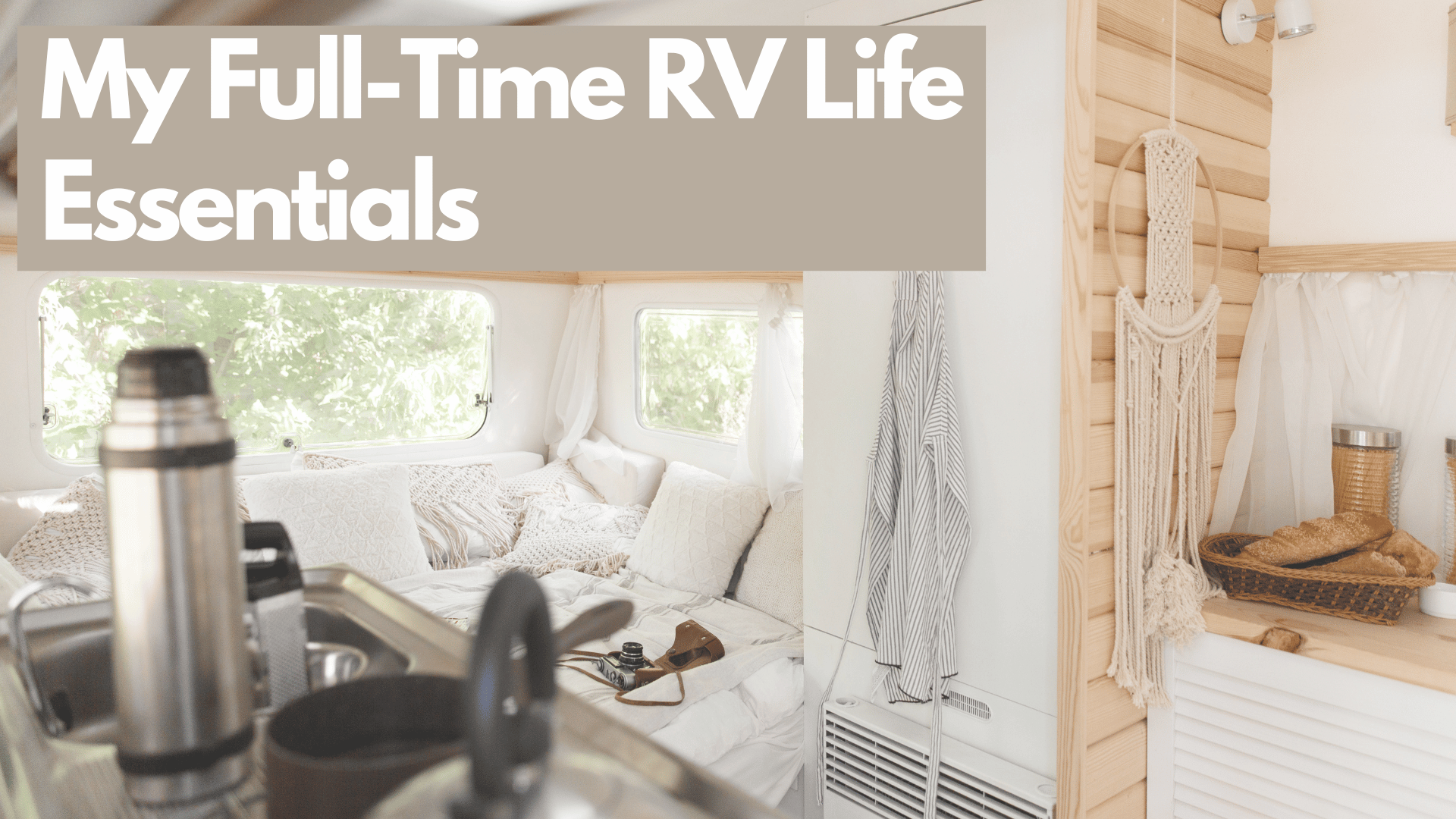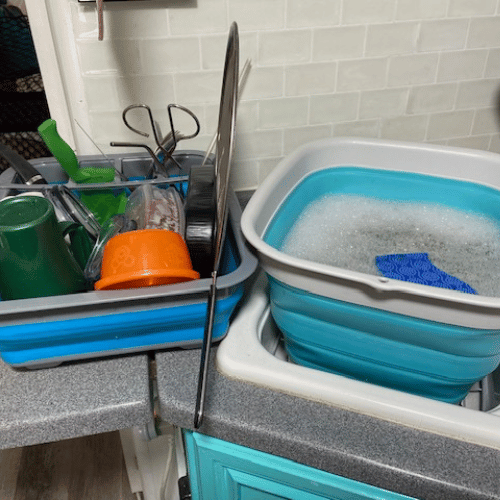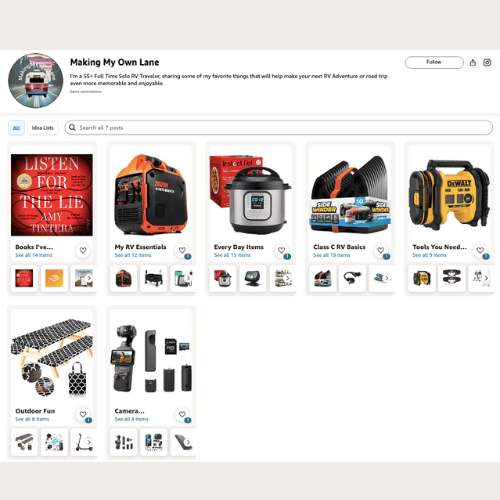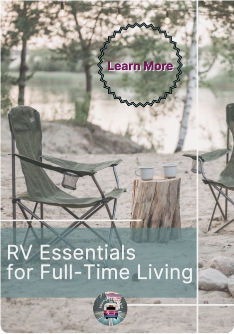RV Essentials for Full-Time RV Living

RV Essentials for Full-Time RV Living Must Haves
Updated April, 2025
Written by Nancy Carter, Making My Own Lane
This post may contain affiliate links, which means we may receive a commission, at no cost to you, if you make a purchase through a link. Please see our full disclosure for more information.
So you’ve decided to move full-time into your RV (or at least want to get some significant travel miles in!)
What are the must haves for RV living? What do you need to bring with you? Will you plan where you go or just wing it? Where will you stay at night? Will you be able to access the internet? How much will this cost? Is there any way to save money on gas?
What do you need to bring with you in your RV to be make it feel more like home?
It seems never ending. There’s your first hint - make a list, or several lists. My list now isn’t so different as when I first hit the road, although I did overpack at first. Downsizing is a continuous process, and everyone’s wants and needs are different.
Going from a 3,000 square foot house with a pool to a 200 square foot house isn’t easy, but it is doable.
Or maybe you are setting out and keeping your house, or even getting a storage unit until you know for sure. There is one right way — make your own lane and do whatever works best for you. You can always make changes along the way.
Second hint - your life in an RV will be different than your life in your house. BOGO’s from the grocery store and Costco memberships for bulk paper products may not work for you anymore. It all has to fit in a small area, and leave space for you and any pets.
At first, I spent a lot of time on travel days putting boxes and things on my bed when I was driving to keep them, and my pets, safe from the somewhat bumpy ride when everything seems to shift and have a mind of its own about where it should be.
As I got tired of either having to move things around or pick things up, I was able to downsize even more and find homes for the things I had to put on my bed when I traveled.
I have even started another pile for Good Will of more clothes and other items I don't feel I will use.
Everything in my RV has a double use
For example, the microwave is a great place to store snacks and bread. Even on non-travel days. It keeps them more fresh than just having them in a cabinet.
The oven stores my pans and tin containers.
The shower doubles as a place to keep the kitty litter.
I still have quite a bit to sort through. For the first few months, I reorganized every week. I disposed of things that I thought would be important, like my padded mattress pad that just ended up giving me a backache.
I bought a collapsible sink for doing dishes, which doubled my sink capacity. I bought a collapsible dish drainer to hold the dishes while they dried.

I bought a collapsible wagon for laundry days. Lugging 2 big laundry bags, plus detergent, bleach, dryer sheets AND quarters was too much for me (or anyone!). And my wagon helped me get everything to the laundry, and back to the RV, without losing anything, including my mind.
Do you see a theme so far?
Third hint - Collapsible items. Things that you can make bigger when you need them and smaller when you want to tuck them away.
I was given a foldable table that is less than 18” square flat when folded, but can be used to cook on or eat at when set up.
A 2-room shower tent/changing room is great when you are staying somewhere for a while, and want to empty out your RV for more living space. I use it for firewood, extra water, my cooler, camp chairs when it's raining, my foldable ladder … anything that you can get out of your RV so you have more room for you inside.
Or my recent addition of a shed/bike storage tent that is fast and easy to set up and take down (collapsible), and can store some of the lesser-used items from the RV when I am staying in one place for a little while. I use it to empty out my tiny house and store things that normally take up living space, like an extra water container, Willie’s dog pen (if I don’t set it up), firewood, extra folding chairs and my beach chair. Things that I’m not ready to give up yet, and hopefully no one will take them, but they give me a little extra space and keep the campsite tidy.
And none of these collapsible items take up a whole lot of space or weight.
I also bought collapsible fabric bins from the Dollar Tree to put in for my clothes, some food, laundry items and first aid things. I labeled each one of them with one of those plastic name tags and a clear zip tie, so that I could find the things I so carefully packed away.
RV Small Kitchen Appliances
A small electric heater with auto shut off if it gets tipped over
A small washing machine with a spin dry function great for smaller items.
Portable power station/solar powered generator
All of these were items I already had, except for the washing machine.
Storing food in your RV
Because I am living in my Class C motorhome, full-time, I have to remember to treat this as a lifestyle, not a vacation. Which means cooking at home more than eating out.
I try to plan out 2 weeks of food at a time, whether I am traveling or stationary. This helps to keep me on budget, while remembering to use the food I buy instead of throwing out the things I forgot I had when they go bad.
Remember, what you put in your RV, you have to find a place for. Your fridge is probably smaller than the one you are currently used to.
Leftovers often go into containers and in the freezer. I like to have 3 frozen prepared meals in my freezer. This comes in handy on travel days when I don’t feel like cooking after driving all day, or on a rainy day when the scheduled food truck doesn’t come.
Instead of going out and buying everything new, I was able to take things from my existing kitchen, right down to my cooking utensils and silverware. If I used it at my house, I would probably use it in my RV.
The only thing I bought new was unbreakable dishes and bowls, for obvious reasons.
RV Outside items essentials
You will need a hose to attach to fresh water, and a special hose for black and gray water (don’t forget the gloves).
I have separate drawstring bags for my fresh water hose and water filter; my electrical cord, adapters and surge protector; and another bag for extra items like tent stakes and extra electrical cords.
You will probably want a camp chair to sit in while you enjoy your morning coffee outside, or warm your toes around a campfire in the evening. I like to have 2 chairs so people think there’s more than one person in my camper (solo rver trick).
You might want an outside rug, or doormat, to help keep the sand and dirt out of your RV.
You will need some sort of leveling system for those times, more than not, when you have to level your camper. Because my Class C RV is a dually with double-rear wheels on the driver and passenger side, I bought double-width leveling blocks.
I also have a separate bin where I keep washer fluid, a small bottle of bleach, extra motor oil and things like that. I like to keep them in a plastic bin they are easy to find and won’t leak out all over everything else.
Having an air compressor and a way to check your tire pressure is essential.
I also bought a ladder for when I clean the RV or need to get up on the roof. There is ladder access on the back, but with 8 solar panels on the roof, it doesn't leave much room for walking around on the roof.
You may want to bring a bicycle, or an ebike. I decided on a foldable electric scooter. I can use it on bike trails, run a quick errand or just get around the campground quickly. Because I am so limited on space and I do not have a car (tow vehicle) at this time, it provides me with a form of transportation that does not take up a lot of room or require an extra rack of any kind. It folds up and tucks away ( it’s collapsable), can go up to 20 mph, and recharges pretty quickly, and it’s a lot of fun to ride!
Are you running out of room in your RV yet? Because wait, there's more!
Safety Items for your RV
In this category, it is important to include fire extinguishers and fire extinguishing items. Fires can rip through an RV so quickly, so on top of my regular fire extinguisher, I have set up self-activated fire extinguishing balls in key areas in my RV.
If these balls detect fire, they pop and release a fire extinguishing agent to a 13-foot radius to help remove the oxygen from the area with the fire while the dry agent puts out the fire.
As a full-time Rver you will also need a safe place to keep important documents. I bought a small , lockable, fireproof file box to put my passport and other hard-copy documents that I need to keep.
RV Tech essentials
This depends on your personal preferences.
I have a laptop computer, an Ipad, 2 Alexas (don’t judge), 2 TV’s, a blu-ray player (for those nights there’s no internet and I don't have any movies downloaded), and several security cameras, as well as a temperature monitor to keep my pets safe.
I did purchase an Akaso camera that I use as a dashcam and a trail cam on my hikes.
RV Internet essentials
I am currently running it all off a T-Mobile home system, which is not foolproof. I do use my ATT phone plan as a hotspot, as well. Yet there are times that I have no internet or cell service.
Right now I am not willing to invest into a more expensive system, even though I am learning to work from the road. I just can’t justify the cost of Starlink when I can usually drive down the road a bit to a grocery store where I can find a T-mobile or ATT signal.
If you would like my list of essential items I packed, as well as my breakdown/set up checklist that I never drive away before checking twice, you can message me here.
You can see a complete list of things I use to make my RV feel more like home in my Amazon shop.
RV Toolbox essentials
Yes, even if you don’t think of yourself as “handy”, you will need a toolbox with basic tools to at least fix the little things that come up. Some of the things I keep in my toolbox are screwdrivers, a hammer, allen wrench kit, twine, duct tape, electric tape, plumbers tape, extra washers, a tire pressure gauge, extra tent stakes, a small ratchet set, extra gloves, hitch pins and fuses, just to name the basics.
Check out more about what's in my RV Toolbox on YouTube.
RV Trip Planning essentials
Before you go … where are you going? I use Road Trippers, which I will share more about in a future post, along with other planning tools and apps I have found helpful for full-time RV living and travel. If you would like to try Road Trippers free for 7 days, click here.
I also bought a Deluxe Motor Carriers Road Atlas, because I read somewhere it was good to have, although I haven’t used it yet for more than looking at maps of the US and states to see places I might like to go.
All in a 200 square foot home!
You can find a complete list of my favorite RV items in the Amazon Shop ⬆️
I know I will be adding, or deleting, items from this list as I continue to learn how live and travel in my tiny home on wheels, so be sure to subscribe so you get a notification when I makes changes to this blog.
If you had any essential items or tips that I didn’t list, please let me know so we can help each other!
The transition to living full-time in your RV is a process of continuous downsizing. It's about finding new homes for your essentials, and learning to live with less. But once you get the hang of it, you'll find that this lifestyle is worth every bit of effort.
I hope this helps you as you plan your first trips in your RV. May your travels be filled with wonder and magic, and may you find joy in the simplicity of minimalism.
Thanks for reading!
Tap to share on Pinterest ↑
You can subscribe below for updates as we travel, or leave a comment here.
I post new articles every Friday.
Thank you for subscribing!
Have a great day!

Hi there! I'm Nancy.
In 2023, I ditched my heels for hiking boots, sold my house, and decided to travel the US full time in my 2005 Lazy Daze Class C RV.
I love to share the places I travel to and what it's like to live in an RV full-time.
If you have ever thought about hitting the road and traveling in an RV, either in your free time or full time, you are in the right place!
Follow along for weekly blog posts about my adventures as I travel the US with my two dogs, Rufus and Willie, and my cat, Katie.

